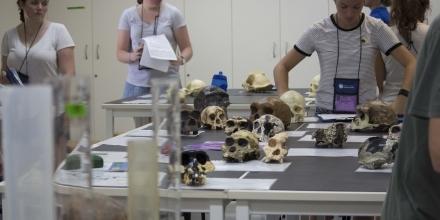
Biological Anthropology is the branch of anthropology that seeks to understand humans in an evolutionary context. It takes a multi-disciplinary approach to understanding human origins and behaviour and encompasses subjects such as primatology, palaeoanthropology, human behavioural ecology, genetics, skeletal biology, demography, evolutionary ecology and forensic anthropology to provide a deep understanding of the biology and culture of humans living today.
Of the wide range of topics available for study, the courses offered in the School of Archaeology and Anthropology focus in particular on the following key areas:
- Primatology, which is the study of non-human primates, the closest living relatives to humans. It is a diverse subject and includes studies of the biology, behavior, health, ecology and conservation of non-human primates.
- Palaeoanthropology is the study of fossil evidence for human evolution, where the fossil record is used to make inferences about the lifestyles of our extinct relatives.
- Human behavioural ecology is the study of human behaviour in evolutionary perspective. Research in this area of biological anthropology uses data collected from quantitative ethnographic fieldwork or found in archival sources on human social, reproductive, demographic, and productive behaviour. It is one of the true biocultural approaches within anthropology as it is guided by theory and methods from both the natural and social sciences.
- Human skeletal biology is the study of the anatomy, structure, variation in the modern human skeleton, and metabolic processes involved in skeletal growth and function. Research in this area of biological anthropology examines a range of traits in archaeological and more recent human bones and teeth to reconstruct the lifestyles, health, and disease of past people, and identify human skeletal remains from forensic and medico-legal cases.\
- Bioarchaeology is the study of the ancient human condition (lifeways, health, disease, behaviour) as explored through human remains in the context of archaeological data.
- Forensic anthropology is the medico-legal application of biological anthropological techniques to addressing questions of identity (e.g. origins, sex, stature), time-since death and manner of death with respect to recent (modern period) human remains.
Biological Anthropologists in the School of Archaeology and Anthropology are actively engaged in research and teaching across all of these areas. Staff have research experience in many regions including Australia, New Guinea, South and South East Asia, Africa and Europe.
Find out more on Biological Anthropology degrees, courses and field schools
Biological Anthropology Research Groups
- Human Behavioural Ecology Research Group
- Palaeoanthropology and Primate Evolutionary Biology Research Group
- Primatology Research Group
- Skeletal Biology and Forensic Anthropology Research Group
- 3D imaging, Evo-Devo Research Group
Undergraduate Journal